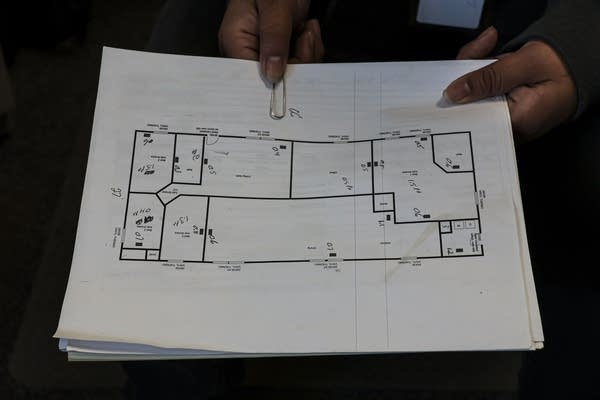Agency combats poverty one energy audit at a time

Go Deeper.
Create an account or log in to save stories.
Like this?
Thanks for liking this story! We have added it to a list of your favorite stories.
With winter fast approaching, a nonprofit called MAHUBE-OTWA is working to winterize homes throughout northwest and central Minnesota. The organization was formed in the mid-1960s as part of President Lyndon B. Johnson's “War on Poverty” and is still meeting the challenge.
Homeowners who have qualified for other programs offered by the nonprofit are automatically eligible for the winterization program.
As a community action agency, MAHUBE-OTWA is part of a national network that since its creation has assisted over 40 million people living in poverty. Currently, the Detroit Lakes-based agency has a budget of more than $17 million.
Its name sounds like it’s rooted in an Indigenous language, but it's actually an acronym for the five counties it serves: Mahnomen, Hubbard, Becker, Otter Tail and Wadena.
Turn Up Your Support
MPR News helps you turn down the noise and build shared understanding. Turn up your support for this public resource and keep trusted journalism accessible to all.
Mahnomen is the poorest county in Minnesota. It’s also home to the White Earth Nation. MAHUBE-OTWA energy auditor Gerilyn Lopez is a citizen.
Her work today reflects her past.
“I grew up and my parents used MAHUBE to get help, too,” Lopez said. “So I seen how well that helped. And I want to do that to help people.”

On a recent morning, Lopez began her first audit of the day in a Detroit Lakes rambler-style home.
As she gauged the home’s heating efficiency, Lopez followed a strict checklist. She measured the house including the windows. She inspected the attic and furnace. She also checked air flow in each room.
An audit can take Lopez between four and five hours. But fixing problems she finds can reduce heating costs by 30-35 percent.
The process also includes other workers from MAHUBE-OTWA and contractors so that checks and balances are in place and potential problems aren’t overlooked.
Homeowner Heidi Huso said she was initially reluctant to reach out for help. But being a single mother living on one income while receiving no child support caused her to reframe her idea of assistance.
“I was very hesitant because I didn’t want to take away from somebody who, you know, may be in a worse situation,” Huso said. “But I was told that there are grants and that they help everybody and so not to feel like I was taking that away or that I was doing something I shouldn’t because I could find a way to make it on my own.”
Huso says working with Lopez has been a wonderful experience.
“It’s been great because she has been, I feel, almost over-efficient,” Huso said.
One of MAHUBE-OTWA’s goals is to get more involved in tribal communities. It’s adapted the application process so people can go through White Earth or MAHUBE-OTWA. The organization has also hired more Native American staff members to help facilitate the process.
Lopez says despite the reservation divide their organization has no real barriers when it comes to helping people within those boundaries. But she says the process begins one community at a time.

“We’re trying to reach out to more people on the reservation here about getting help with energy assistance and getting the list for weatherization done,” she said. “I don’t think a lot of people know that we can help.”
Once the audit is complete the upgrades needed for each home are contracted out to independent companies.
MAHUBE-OTWA's executive director Liz Kuoppala says it services an area of over 5,000 square miles.
"We’re trying to help people move out of poverty, including energy poverty. And so many of our households in this area live in really old homes, or old apartment buildings,” Kuoppala said. “And so, what we’re trying to do is weatherize them to make them more efficient. And so, we start with people who are already accessing energy assistance, which we deliver here.”
The weatherization program is made possible through the Department of Energy and is administered through the state Department of Commerce.
When Gerilyn Lopez began working as a winterization auditor for MAHUBE-OTWA about a year ago she said she never could have imagined the opportunities it would present. She’s been so successful at her job that recently she was a panelist for the first-ever White House Summit on Building Climate Resilient Communities.
“It’s unbelievable. I didn’t really think anything like that happened,” Lopez said. “I thought I would just you know go to work, take care of my family go home. Work my way up the ladder. But I didn’t think I’d go off and travel and do speeches and panels for anything but it’s pretty interesting.”

Her colleague Dan Josephson — MAHUBE-OTWA’s director of energy programs — said one of the biggest challenges they face is that they only have three auditors to inspect 6,200 homes that qualify for the program.
It equals servicing about 80 to 100 homes a year. However with a recent funding increase he hopes to hire more auditors so that their organization can help more people.
Josephson sees the work as a step in the right direction.
“It’s helping seniors, it’s helping people that don’t have the means to do the upgrades in their homes for just comfort level safety issues,” he said. “As we’re looking at climate change this is something that we’re doing to reduce that dependence on our energy systems. So, it’s multifaceted, it helps people’s health, it helps people's wallets, it helps people in general.”
Correction (Nov. 20, 2023): An earlier version of this story misspelled Lyndon B. Johnson’s first name.


